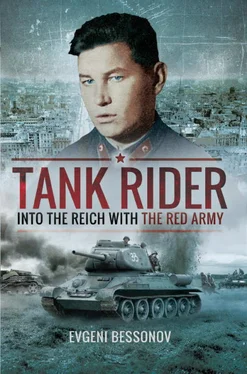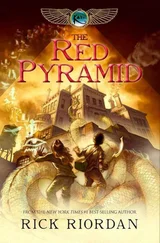Nevertheless, two or three soldiers abandoned their foxholes and hid behind a hut, which was still on fire. I brought them back to their initial place – back to the trenches. If you do not nip panic in the bud, then your unit becomes uncontrollable. This is why I strictly warned the squad leaders of those two soldiers who ran away from the trenches without order. So, almost all night long I had to run back and forth from trenches to tanks and then back to trenches, all the time under enemy fire. I was steaming, I was constantly thirsty; it was good that there was a well nearby, my orderly scooped water from the well with a canteen and I gulped it down. The whole village was on fire, it was as bright as day. I had to lead almost a company in action in these conditions – two platoons and a machine-gun platoon, plus I had to force our tanks to fire, while the tanks were always trying to retreat to a safe place. This running around almost cost me my life. I could be seen for miles in the burning village, so as soon as I jumped into a foxhole, a shell exploded on its breastwork. The breastwork was smashed, while private Ivanov and me were deafened by the explosion. The worst thing was that the trench was just few metres from a burning house and it was too hot in that foxhole. The foxhole was clearly visible against the glare of the burning house, but the second shot never came, apparently Germans thought we were dead. I quickly moved to another foxhole, permitting Ivanov to go to the first-aid station, as he was slightly shell-shocked.
Before dawn the Germans ceased fire and then altogether disappeared from our sight. Apparently, their mission was not to destroy our battalion and the Brigade, but rather to delay our offensive for as long as possible in order to rescue their units from destruction and encirclement in another sector of the front. Despite the intensity and length of the battle, our losses were insignificant. At dawn Guschenkov and I found company commander Chernyshov and 3rd platoon leader Vyunov. I reported the losses to the company commander and we exchanged our opinions about the engagement. The battalion’s field kitchen had managed to cook breakfast by that time and we sent two or three men from each squad with mess tins to bring the food, just like we always did. My orderly and I had breakfast from the same mess. If we could, we washed our messes after meals or wiped them with grass. If someone was still hungry, it was always possible to get extra food, as they cooked food for the whole battalion and the battalion had losses…
We started to march after breakfast, first on foot and then we clambered aboard the tanks. The battalion was moving as the Brigade’s forward task force, and the Germans did not try to set up serious defences, but by the end of the day a strong German delaying force stopped us. Our companies attacked several times, but were thrown back with losses in personnel. German artillery, especially anti-tank guns, were especially active. We had to stop and dig in. During daytime the enemy did not let us move – as soon as they spotted movement they opened fire. Only with the arrival of darkness could we move – we put ourselves in order and counted our losses. Just as I was lying down to have a nap, an orderly found me and passed on the order of the battalion commander to go to battalion staff. When I came to Kozienko, I saw deputy brigade commander Starovoit and tank regiment commander Stolyarov at his CP. They were all in a tent that was set up in a hollow. They had a portable electric lamp in the tent. It was not battalion commander Kozienko, but tank regiment commander Stolyarov who addressed me: ‘You, Bessonov, have got an important mission,’ he said. ‘With three tanks you and your platoon must cut the road that the Germans are using, you must stop them, advance forward and capture the German artillery, thus securing the Brigade’s further advance.’ I really did not want to go there to die, I really wanted to sleep. That was my second night and second day without sleep. Yes, it was an order, but I lost my self-control: ‘Don’t you have any other officers except Bessonov in the battalion? I always have to go first, I’ve been 48 hours without sleep already!’ Lieutenant Colonel Starovoit answered to me: ‘We did not choose you at random, we believe that you will complete the mission and we are more doubtful about the other officers.’ Major Kozienko repeated the order: ‘Go and fulfil the order.’ What could I do, it was an order and I had to obey it! The tank platoon leader also came up to us. We knew each other from previous battles and quickly developed a co-ordination plan. I had a comment to make here as well, saying that the tanks should assist the tank riders, not hide, as it was in the night action for the village the night before. Major Stolyarov was not offended with my comment; on the contrary, he drew the tanker’s attention to it: ‘A tank is designed for a battle, it is not just a coach for tank riders.’
At night from 14 to 15 January we moved forwards to complete our mission. I put a squad (seven or eight men) on each of the three tanks that I had. The tanks deployed in a line some 20 or 25 metres apart. The tanks drove forward at low speed on my command. There was intensive German traffic on the road, and so the Germans could not hear the noise of our tank engines. It was a dark and cloudy night, one could not see stars. We advanced towards the road and stopped some 30 metres from it. As we had previously arranged, each tank fired one round from its main gun, a long machine-gun burst and then ceased fire. At the same moment the tank riders jumped off the tanks and rushed to the road, firing their submachine-guns on the move at the German vehicles. When we ran up to the road, the German column stopped. Cars stood there filled with luggage and sacks full of German food and wine. The Germans ran like a hare before hounds – I was always amazed by how quickly they could run. Apparently, this was a retreat or relocation of a large unit’s staff. The enemy was thrown from the road and the way for Brigade lay open. We threw the bags on the tanks and rushed forward, capturing an artillery battery with prime movers, one of which still had the engine running. We did not see the Germans, but in the darkness we could hear that they were running away, breaking bushes and tree branches. Yes, Germans were fast runners, great runners – especially when death was looking them in the eye.
We advanced a bit further on tanks, some 2 or 3 kilometres from the road. The tank crews reported to Stolyarov that the mission had been completed, German traffic had been stopped and the Germans were nowhere to be seen; we also reported our co-ordinates. I did not have a radio and had to maintain communications with the command through tank radio. We received an order to wait for the main body of the Brigade. We had to wait for it for a long time; it was growing light.Visibility was good. A cold day came, we waited in a forest and there was no wind. We had a snack using the German food – of course, we shared the food with the tank crews. Tanks with tank riders of our battalion appeared. Battalion commander Major Kozienko arrived, but I did not see the company commander Chernyshov. During the whole operation I was receiving orders from battalion commander or even Major Stolyarov, the tank regiment commander, and in fact never saw the company commander. At that point the battalion commander gave a new order – to inspect several houses located far from the road.
I deployed my platoon in a line, and the enemy fired several rounds at us, but they all missed. We rushed into the houses, and in close combat, even in hand-to-hand fight we destroyed the Fritzes. Some of them fled, and we did not pursue them. My platoon did not have any losses. The mission was thus completed and we came back to the battalion.
Читать дальше












